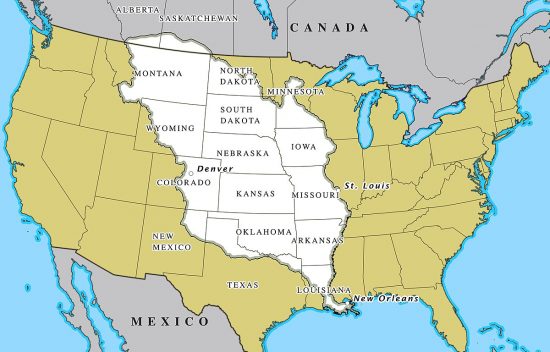
Thomas Jefferson and the Louisiana Purchase
Guiding Question:
- Why did President Thomas Jefferson, an advocate of strict construction of federal power, approve of the Louisiana Purchase?
Objectives:
Students will:
- Understand the events leading up to the Louisiana Purchase.
- Analyze Thomas Jefferson’s views of the Purchase’s constitutionality.
- Assess the constitutionality of the Louisiana Purchase.
- Appreciate Jefferson’s dilemma between expedience and constitutional scruples.
- Handout A: Thomas Jefferson and the Louisiana Purchase
- Handout B: Jefferson’s Views on the Louisiana Purchase
To create a context for this lesson, have students complete Constitutional Connection: The President and Federal Power.
Have students read Handout A: Thomas Jefferson and the Louisiana Purchase and answer the questions.
Divide the class into six groups and give each group a quotation card from Handout B: Jefferson’s Views on the Louisiana Purchase.
Have students read and discuss the main ideas of their quotation. They should then write the quotation in their own words on the card.
On the board, draw a long horizontal line to form the basis of a continuum. On one side of the line write “The Louisiana Purchase DOES require a constitutional amendment.” On the other side, write “The Louisiana Purchase DOES NOT require a constitutional amendment.”
Ask a spokesperson from the group with the first quotation to read it aloud, and then put it in their own words. Go over the meaning of Jefferson’s statement.
Ask a different volunteer from that group to take their quotation card and place it on the continuum to demonstrate where Jefferson’s view would fall.
Continue with all the groups until all cards have been placed.
Debrief the class on what they observe about the changes on Jefferson’s views. Then, using the Answer Key, rearrange the quotations to reflect chronology and debrief again.
As a large group, discuss the evolution of Thomas Jefferson’s views on the necessity of a constitutional amendment to authorize the Louisiana Purchase.
- Did his views actually change?
- Given the force of Jefferson’s earlier statements about the importance of holding the national government to the exercise of its enumerated powers only, would it be fair to call him a “flip-flopper”? Why or why not?
Have one half of the class draw a political cartoon that might have been published by a Federalist newspaper on Jefferson’s acceptance of the Louisiana Purchase without a constitutional amendment. The other half should draw a cartoon that might have been published by a Republican paper. All cartoons should feature the Constitution as a graphic element. Have students post their cartoons around the room and give students time to view them all.
While many historians credit Jefferson’s vision and diplomatic skills in securing the Louisiana Purchase, others give more credit to mosquitoes—arguing that Napoleon simply had to change his priorities after losing too many soldiers in the Caribbean to malaria. Have students conduct additional research about the Louisiana Purchase and Jefferson’s involvement and write a position paper in which they convince their reader that Jefferson does or does not deserve the credit for the Louisiana Purchase. Students can begin their research at:
www.monticello.org/jefferson/lewisandclark/louisiana.html
